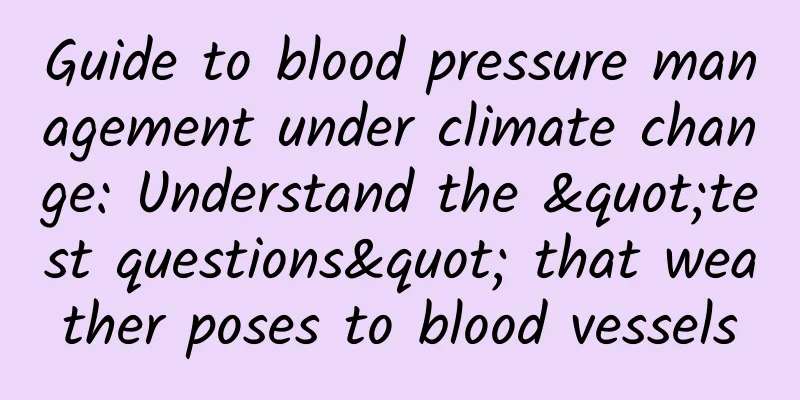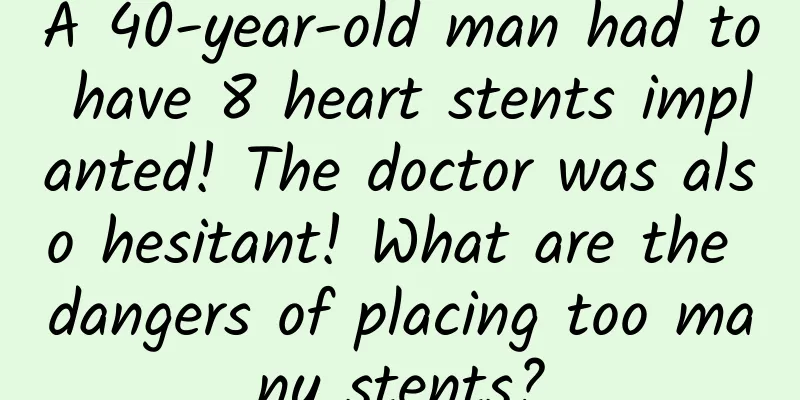Guide to blood pressure management under climate change: Understand the "test questions" that weather poses to blood vessels

|
(The full text is about 1,500 words and takes 3 minutes to read) Real case: 65-year-old Mr. Wang gets dizzy every time the season changes, and his blood pressure soared to 170/100 mmHg during the recent cold wave. This is not an isolated case - studies have shown that for every 10°C drop in temperature, systolic blood pressure rises by an average of 6.2 mmHg (Hypertension Magazine, 2018). Climate change is quietly rewriting the health management equation for 330 million Chinese hypertensive patients. 1. How does the weather "control" your blood pressure? 1. Temperature Trap Cold (<12°C): stimulates α receptors to cause vasoconstriction and increased blood viscosity, just like the water pressure surge before a pipe freezes Hot (>32℃): Excessive sweating causes blood concentration, and the temperature fluctuation between the air-conditioned room and the outdoors makes the blood vessels experience a "roller coaster" 2. Humidity When humidity is >80% during the rainy season, the perceived temperature is 3-5°C higher than the actual temperature, which increases the workload on the heart (data from the China Meteorological Administration) 3. Air pressure puzzle When the air pressure drops suddenly before a typhoon, hypoxia stimulates the sympathetic nerves, causing blood pressure fluctuations similar to altitude sickness. 2. "Secrets" for blood pressure management in all four seasons Winter (November-February) Three Slow Rules for Waking Up in the Morning: Lie in bed for 3 minutes after waking up → Sit up for 3 minutes → Stand by the bed for 3 minutes Clothing pyramid: moisture-absorbing layer next to the skin (cotton) middle warm layer (wool) outer windproof layer (down) Medication warning: Diuretic users should be alert to hypothermic hyponatremia (manifested as fatigue and nausea) Summer (June-August) Hydration formula: Daily water intake = body weight (kg) × 30ml sweat volume (about 500ml for 1 hour of moderate intensity exercise) Air conditioning rules: set the temperature to 26-28℃, with the air vent facing upwards, and ventilate for 10 minutes every 2 hours Drug precautions: ACEI drugs should be used to prevent orthostatic hypotension when exposed to high temperatures Seasonal period (March-May/September-October) Implement "blood pressure weather warning": install a weather app that can display air pressure, temperature and humidity Strengthen dynamic monitoring: measure blood pressure once in the morning and evening, and measure blood pressure in the afternoon when the temperature difference is greater than 10℃ Flexible medication adjustment: Long-acting CCB drugs can be taken at 7 a.m. (morning peak blood pressure control) 3. Special Weather Defense Guide 1. Haze days (PM2.5>75μg/m³) Wear an N95 mask (reduce PM2.5 inhalation by more than 60%) Turn on the air purifier indoors (CADR value ≥ 300) 2. Typhoon days (air pressure < 990hPa) Take sustained-release magnesium (200-400 mg/day) 1 day in advance to relieve vasospasm Have chewable antihypertensive medications (such as sublingual captopril tablets) ready 3. Sandstorm (visibility < 1km) Use artificial tears to prevent dry eyes (avoid rubbing your eyes, which can cause a sudden increase in blood pressure) Stop morning exercise and switch to indoor Tai Chi (reduce the risk of falling by 50%) 4. Essential skills: Establish a personal blood pressure weather file 1. Recording template: Date | Weather | Temperature | Blood pressure (morning/afternoon/evening) | Symptoms | Medication 9.1 | Clear | 28℃ | 125/80 | None | Amlodipine 5mg 9.5 | Rain | 22℃ | 140/90 | Dizziness | Amlodipine 5mg Perindopril 4mg 2. Selection of smart wearable devices: Preferably an electronic blood pressure monitor with an air pressure sensor (such as Omron HEM-7361T) Sports wristbands that can synchronize weather data (Huawei Band 8, etc.) Experts remind: The World Hypertension League recommends that when the temperature difference exceeds 8°C for three consecutive days, you should seek medical attention and adjust your treatment plan in a timely manner. Remember: your blood vessels are more sensitive than the weather forecast. Establishing a "blood pressure-climate" dual monitoring system is a double insurance for your health. Action Guide: Starting tomorrow, record your blood pressure and weather data for a week and bring it to your doctor when you see a doctor - this will reveal the truth about your blood pressure better than any expensive test. (Data support: White Paper on Climate Change and Cardiovascular Health by the National Center for Cardiovascular Diseases, and Guidelines for the Prevention and Treatment of Environmental Hypertension by the WHO) |
<<: 1 in 10 people are affected! Why can kidney disease remain "invisible" for many years?
>>: You may not think that these symptoms are related to lack of sleep →
Recommend
Acne in the middle of the cleavage
Having healthy and beautiful breasts is a beautif...
What should I do if my dysmenorrhea is made worse by drinking brown sugar water? Pay attention to prevention
Dysmenorrhea is a physiological problem that many...
Breast enhancement acupoint massage method
Many people have flat chests due to poor developm...
How long does it take for the cesarean section incision to not hurt?
Compared with natural birth, the pain of cesarean...
How to massage and treat back pain after childbirth?
In the early stages of pregnancy, there will be n...
What to eat after abortion
Women must pay careful attention to take care of ...
3 types of breast fibroids that women should beware of
Estrogen is the main culprit that causes breast f...
Wearing high heels often can cause arthritis in old age
Women should try to avoid walking in pointed high...
Ovulation 15 days after bleeding successful pregnancy
Ovulation is just like a woman's menstrual pe...
How to match a suspender skirt
Every girl’s wardrobe must have a suspender skirt...
Will oxygen inhalation during high altitude sickness lead to addiction? Here’s what you should know before traveling to high altitude areas!
gossip "When you have altitude sickness, you...
Don't do strenuous exercise after drinking at a Spring Festival party! Because...
People who love sports will face a problem during...
How many snow-capped mountains are there in Shangri-La? When is the best season to have fun in Shangri-La?
Shangri-La is an international boutique tourist t...
How to make good use of bedroom bay windows? Decoration skills of bedroom bay windows
We all know that different houses have different ...









